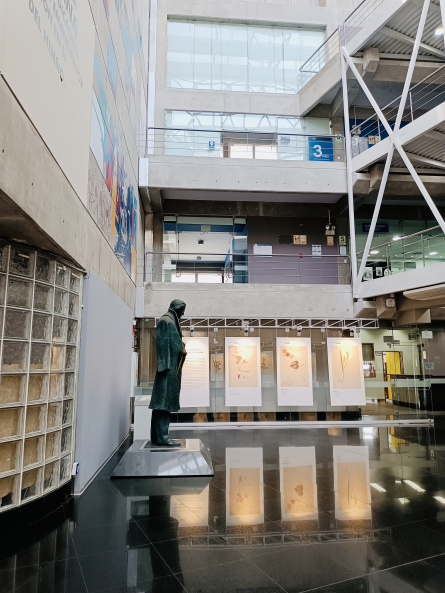
Josefine Dehn is a doctoral fellow in the sub-project B10 of the CRC, Armed Conflict and Dynamics of Social Policy, and studies the influences of internal wars on state social policy based on the case of Peru. The civil war there (1980-2000) between the Peruvian state and various guerrilla groups is considered one of the bloodiest in Latin America in the 20th century. In her dissertation, Josefine looks at the period from 1990 to 2000, during which several key events of the conflict took place. In general, the influence of warfare on the development of social policy has been rarely investigated to date, this is particularly true of intrastate wars and despite their worldwide occurrence. With her dissertation, Josefine wants to address this research gap from a political science perspective.
Josefine recently returned from a research trip to Peru, where she spent three weeks collecting data for her dissertation and the CRC sub-project in various archives and libraries. It was her second trip and Josefine spent a total of almost seven weeks in Lima, the capital of Peru. During this time, she researched several times in the National Archives and the archives and library of the Peruvian Congress, which are located in the historical centre of Lima. She also visited several locations of the National Library of Peru and the library of the Institute of Peruvian Studies, a prestigious interdisciplinary and non-governmental social science research institute focussing on Peru and Latin America.
During her research, Josefine was able to collect a wide range of empirical material for her dissertation and sub-project B10, on the one hand on the civil war and on the other on social policy developments in Peru between 1990 and 2000. This include various government documents, e.g. reports and yearbooks, detailed social expenditure data, parliamentary documents from legislative processes on social policy, collections of laws on social security for certain groups affected by the civil war, detailed reports and analyses on the internal conflict by the Commission of Truth and Reconciliation, as well as secondary literature.
One of the challenges Josefine faced during her trip was that primary sources in particular at times were difficult or impossible to access. The reasons for this are, for one thing, that even more than 20 years after its official end, the civil war is still a sensitive topic in Peru. Due to this, Josefine was sometimes only able to address it indirectly when consulting archive and library staff. For another, the institutional responsibility for the storage of certain documents was sometimes unclear even to the responsible staff of the archives and could not be determined. Despite these difficulties, however, Josefine was able to find sufficient promising primary and secondary sources, which she will now analyse as part of her dissertation. In the coming months, she will investigate which of a series of influences previously derived theoretically for the case of Peru can actually be identified empirically and, in particular, whether certain groups of particular importance to the state were favoured in the public social policy development during the civil war. These findings can then serve as an initial point of reference for further research.
For Josefine, the research trips offered an exciting but also challenging experience, plenty of food for thought and even more motivation for her research project. Peru is a fascinating country, but there are still major differences in access to and the scope of public social policy. The extent to which the Peruvian civil war has influenced these developments is therefore a step towards better understanding and combating this persistent inequality.
Contact:
Josefine Dehn
Feldkirchenstraße 21
96045 Bamberg
E-Mail: josefine.dehn@uni-bamberg.de










